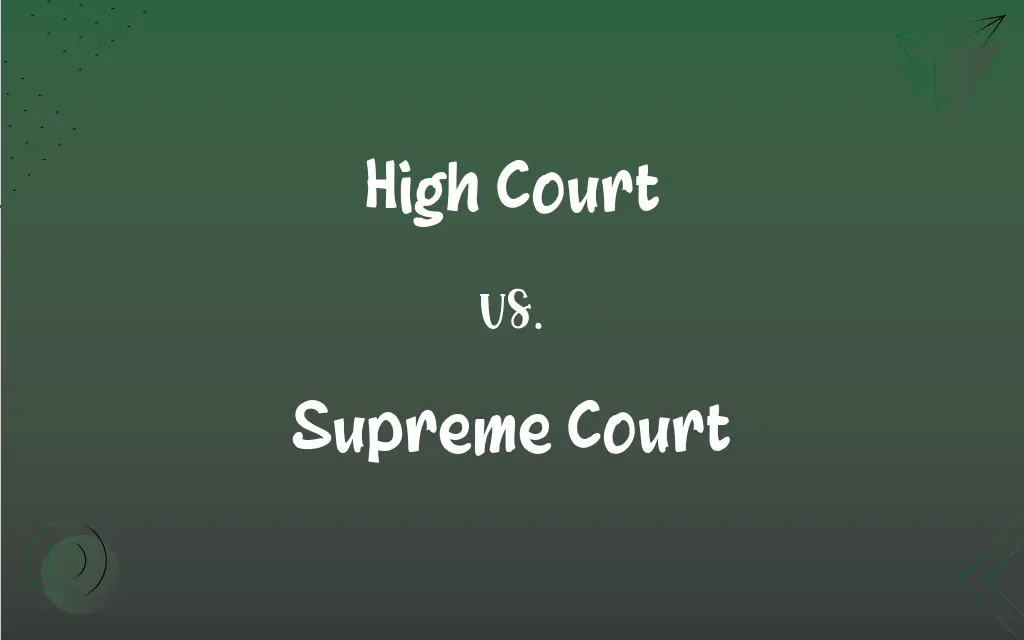High Court vs. Supreme Court: What's the Difference?
Edited by Harlon Moss || By Janet White || Published on November 9, 2023
The High Court is a regional appellate court, while the Supreme Court is the highest judicial authority in a country, handling national matters and final appeals.

Key Differences
The High Court and the Supreme Court serve distinct roles within the judiciary system. The High Court is often a state or regional-level court that addresses appeals from lower courts. In contrast, the Supreme Court stands as the highest court in a nation's legal hierarchy.
While both the High Court and Supreme Court handle appellate cases, their jurisdictions differ. The High Court typically deals with appeals from regional or state lower courts, ensuring the correct application of the law. The Supreme Court, however, oversees national legal matters and is the final court of appeal, ensuring the uniform application of national law.
When considering their authority, the High Court usually has the final say in state or regional matters unless a significant point of national law is involved. The Supreme Court holds ultimate judicial authority and can override decisions made by the High Court if cases are escalated to it.
Both the High Court and the Supreme Court play crucial roles in maintaining the integrity of a country's legal system. The High Court ensures that state or regional legal matters are addressed appropriately. In comparison, the Supreme Court ensures that national law is consistently and fairly applied across the entire country.
In terms of composition, both courts consist of multiple judges. The High Court might have fewer judges than the Supreme Court, which usually has a Chief Justice along with associate justices. The appointment, tenure, and functions of the judges can vary based on the country's constitution or legal framework.
ADVERTISEMENT
Comparison Chart
Jurisdiction
State or regional appellate jurisdiction
National jurisdiction, highest appellate authority
Cases Handled
Appeals from lower regional courts
National matters, final appeals from all lower courts
Authority Level
Regional final authority (unless national law involved)
Ultimate judicial authority
Role in Legal System
Ensures proper application of regional law
Ensures uniform application of national law
Composition
Comprises multiple judges (number varies by country)
Chief Justice and associate justices
ADVERTISEMENT
High Court and Supreme Court Definitions
High Court
A court immediately below the national Supreme Court in hierarchy.
After losing the case, they decided to appeal to the High Court.
Supreme Court
A court with justices appointed to protect and uphold the country's constitution.
The Supreme Court justices serve for life in the U.S.
High Court
A court responsible for supervising lower courts within its jurisdiction.
The High Court directed the lower courts to expedite the trials.
Supreme Court
A body that interprets and decides matters of national significance.
The Supreme Court's ruling set a precedent for the entire country.
High Court
A court of appellate jurisdiction within a specific state or region.
The High Court of the state overturned the previous verdict.
Supreme Court
The highest judicial authority in a country.
The Supreme Court has the final say in constitutional matters.
High Court
A primary authority for interpreting state or regional laws.
The High Court ruled that the regional law was constitutional.
Supreme Court
The final court of appeal in a country's judiciary.
After the High Court's decision, their last option was the Supreme Court.
High Court
A court handling significant cases within a regional boundary.
The High Court will hear the high-profile case next month.
Supreme Court
A court overseeing the uniform application of national law.
The case was escalated to the Supreme Court for its implications on national law.
FAQs
Do both courts handle appeals?
Yes, the High Court handles regional appeals, while the Supreme Court handles final national appeals.
Which court has the final say in constitutional matters?
The Supreme Court has the final say on constitutional issues.
Can a decision by the High Court be challenged?
Yes, in most legal systems, it can be appealed to the Supreme Court.
Which court's decisions have wider implications?
The Supreme Court, as its decisions affect the entire country.
Is the High Court's jurisdiction limited to one state or region?
Generally, yes, but it varies based on the country's legal structure.
Which court is higher, High Court or Supreme Court?
The Supreme Court is the highest court, above the High Court.
How are judges appointed in the High Court?
It varies by country but often involves executive or legislative approval.
Which court has broader jurisdiction?
The Supreme Court, as it oversees national law.
Can state laws be challenged in the High Court?
Yes, the High Court can interpret and apply state or regional laws.
Are High Court decisions always final?
No, they can often be appealed to the Supreme Court.
Are Supreme Court decisions binding on lower courts?
Yes, Supreme Court rulings typically set precedents for all lower courts.
Can a case bypass the High Court and go directly to the Supreme Court?
Rarely, and usually only if of significant national importance.
How many judges are in the High Court?
It varies by country and region.
Can international cases be heard in the Supreme Court?
If they pertain to national law or have national implications, yes.
Who is the head of the Supreme Court?
Typically, the Chief Justice.
Are the functions of the High Court and Supreme Court similar worldwide?
While they share similarities, their functions can vary based on a country's legal system.
How often does the Supreme Court hear cases?
It depends on the country, but usually, the Supreme Court is selective, hearing only pivotal cases.
Does the High Court oversee lower courts?
Yes, it supervises and hears appeals from lower courts in its region.
What's the primary role of the Supreme Court?
To ensure the uniform application of national law and interpret the constitution.
Can both courts make new laws?
No, they interpret and apply existing laws. Legislation is the role of the legislative body.
About Author
Written by
Janet WhiteJanet White has been an esteemed writer and blogger for Difference Wiki. Holding a Master's degree in Science and Medical Journalism from the prestigious Boston University, she has consistently demonstrated her expertise and passion for her field. When she's not immersed in her work, Janet relishes her time exercising, delving into a good book, and cherishing moments with friends and family.
Edited by
Harlon MossHarlon is a seasoned quality moderator and accomplished content writer for Difference Wiki. An alumnus of the prestigious University of California, he earned his degree in Computer Science. Leveraging his academic background, Harlon brings a meticulous and informed perspective to his work, ensuring content accuracy and excellence.







































































